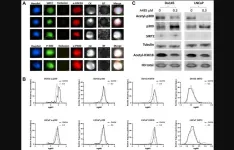(Press-News.org) A potent anti-cancer therapy has been created using Nobel prize-winning “click chemistry”, where molecules click together like LEGO bricks, in a new study by UCL and Stanford University researchers.
The study, published in Nature Chemistry, opens up new possibilities for how cutting-edge cancer immunotherapies might be built in future.
The research team created an anti-cancer therapy with three components: one targeting the cancer cell, another recruiting a white blood cell called a T cell to attack the cancer cell, and a third knocking out part of the cancer cell’s defences.
Previously, this type of three-component therapy has only been built using a complex process called protein engineering, in which DNA sequences for multiple proteins are combined and inserted into a single cell.
One of the three-component therapies the researchers built, which used an enzyme called sialidase to strip away sugars that the cancer cell uses to hide itself, was especially effective at killing breast cancer cells in a dish. The researchers said this showed that the enzyme – which only recently started being explored in cancer research – has the potential to be the basis of next-generation anti-cancer agents.
First author Dr Peter Szijj (UCL Chemistry) said: “Click chemistry is a quicker and more adaptable way to build these multifunctional anti-cancer agents than protein engineering. It’s relatively easy to attach click ‘handles’ to proteins so you can try lots of combinations quickly to test what might work best. Using protein engineering, you need a separate mechanism for each component.”
Senior corresponding author Professor Vijay Chudasama (UCL Chemistry) said: “As proteins are large and complex molecules, you require a combination of precise protein modification and reliable click chemistry to attach them together in a controlled manner. We have achieved this and shown our strategy to be an interesting alternative to using the classical protein engineering approach.”
“We hope that by using chemistry to create novel and highly sophisticated multi-protein anti-cancer agents we can inspire chemists to cross the typical boundaries of the discipline to engage in novel applications in areas such as medical imaging, diagnostics and disease therapies.”
Click chemistry relies on two reaction partners (click handles) that can attach to each other very rapidly and selectively, without the production of any toxic by-products. These click handles can be added to proteins, in this case using functionalised pyridazinediones (PDs), allowing the proteins to click neatly together like LEGO.
The pioneers of click chemistry were awarded the 2022 Nobel Prize in Chemistry. Professor Carolyn R. Bertozzi, of the University of Stanford, who is a co-author on this latest paper, was one of three winners of the prize for her work on biorthogonal chemistry – click chemistry in living cells.
For the new paper, researchers at UCL first clicked two antibody fragments together – one fragment binding to a cancer cell, another fragment binding to a T cell so that it would destroy the cancer cell. Similar T cell engagers, created via protein engineering, have already been approved for use in humans and are used to treat cancers such as multiple myeloma, a rare blood cancer, in the United States and Europe.
The team then added a third component, a checkpoint inhibitor, which removes an aspect of a cancer cell’s defences. This component was either a PD-1-blocking antibody fragment, which is already used to treat specific advanced forms of skin or lung cancer and re-awakens immune cells to target cancer cells; or the more experimental sialidase enzyme, which strips away specific sugars (sialic acids) on the surface of the cancer cell as well as on the T cell. These sugars, present on all our cells, are produced in large amounts by cancer cells and help them to hide from our immune system by switching off approaching immune cells.
The research team found that adding either of these components improved the cancer-killing efficiency of the therapy, and that adding sialidase was especially potent.
The researchers also added a fourth molecule, biotin, allowing them to visualise how well the components bound to their respective targets. They said that this could be substituted for another small molecule with a different function – for instance, to minimize side-effects by masking the protein construct until it reaches its intended target: the cancer.
In the paper, the researchers said that using chemistry in this way to create cancer therapies showed “much untapped potential that is still waiting to be uncovered”.
This sialidase enzyme-containing therapeutic now needs to be tested in animals before any trials involving humans could begin.
The research was supported by Wellcome, with further funding from the US’s National Institutes of Health, the Leverhulme Trust, the EU’s Horizon 2020 programme and UKRI.
END
Potent anti-cancer therapy created using ‘click chemistry’
The study, published in Nature Chemistry, opens up new possibilities for how cutting-edge cancer immunotherapies might be built in future
2023-07-24
ELSE PRESS RELEASES FROM THIS DATE:
Claire K. Ankuda, MD, MPH (Mount Sinai Health System) recognized with AFAR 2023 Rising Star Award in Health Services and Aging Research
2023-07-24
New York, NY – The American Federation for Aging Research (AFAR), a national non-profit organization whose mission is to support and advance healthy aging through biomedical research, is proud to recognize the outstanding contributions of Claire K. Ankuda, MD, MPH, MSc with the 2023 Terrie Fox Wetle Rising Star Award in Health Services and Aging Research.
This award honors a health services researcher in an early or middle phase of his/her career who has already made important contributions with work that respects the value of multidisciplinary health services ...
Ming Xu, PhD (UConn) receives AFAR 2023 Vincent Cristofalo Rising Star Award in Aging Research
2023-07-24
New York, NY – The American Federation for Aging Research (AFAR), a national non-profit organization whose mission is to support and advance healthy aging through biomedical research, is pleased to recognize the exemplary contributions of Ming Xu, PhD, to the field of aging research through the 2023 Vincent Cristofalo Rising Star Award in Aging Research.
This award is named in honor of the late Dr. Cristofalo, who dedicated his career to aging research and to encouraging young scientists to investigate important problems in the biology of aging. Established in 2008, the award is a ...
NIH researcher Rafael de Cabo, PhD receives AFAR 2023 Irving S. Wright Award of Distinction
2023-07-24
The American Federation for Aging Research (AFAR), a national non-profit organization whose mission is to support and advance healthy aging through biomedical research, is pleased to recognize the exemplary contributions of Rafael de Cabo, PhD, to the field of aging research through the 2023 Irving S. Wright Award of Distinction.
This award is named in honor of AFAR’s founder and recognizes exceptional contributions to basic or clinical research in the field of aging. Established in 1982, the award is a framed citation and carries a cash prize of $5,000.
Dr. de Cabo is Senior Investigator of the ...
Muscadine wine shows promise in improving aging skin
2023-07-24
Could muscadine wine help perk up sagging skin? According to a new study, women who drank two glasses of dealcoholized muscadine wine daily showed significant improvements in the elasticity and water retention of their skin compared with those who consumed a placebo.
The study is the first time scientists have studied the impacts of nonalcoholic wine consumption on skin health in a randomized clinical trial. Researchers attribute the beneficial effects to chemical compounds called polyphenols that naturally occur in many plants.
“Muscadine grapes have been found to have a unique polyphenolic profile in comparison to other red wine varieties,” ...
Study explores how often children diagnosed with flu experience serious neuropsychiatric side effects
2023-07-24
While the incidence of influenza-associated neuropsychiatric events in children in the United States is unknown, the controversy over the use of a common antiviral medication typically administered to treat flu in children has sparked concern among parents and medical professionals alike.
The dilemma about whether the treatment causes neuropsychiatric events or if the infection itself is the culprit, led a group of pediatric researchers at Monroe Carell Jr. Children’s Hospital at Vanderbilt to study the question.
“Population-Based ...
Hebrew SeniorLife and Duke University receive $10.5 million award to study osteoporosis care in fracture patients
2023-07-24
Broken bones in later life are a leading cause of disability, recurrent fracture, nursing home placement, and death.
Prior studies have shown that health care providers can prevent poor outcomes, including death, by treating patients with bone-strengthening medications and by stopping risky medications that cause falls. However, few patients receive this high-quality care because it is time consuming and requires specialized knowledge that primary care providers may not have.
Researchers from Hebrew SeniorLife and Duke University will undertake a 5.5-year study that will compare two care models that have previously ...
A multiplex assay to assess activated p300/CBP in circulating prostate tumor cells
2023-07-24
“The results from this initial cohort support the integration of these biomarkers into prospective clinical trials.”
BUFFALO, NY- July 24, 2023 – A new research paper was published in Oncotarget's Volume 14 on July 20, 2023, entitled, “Development of a multiplex assay to assess activated p300/CBP in circulating prostate tumor cells.”
Reduced SIRT2 deacetylation and increased p300 acetylation activity leads to a concerted mechanism of hyperacetylation at specific histone lysine sites (H3K9, H3K14, and H3K18) in castration-resistant ...
UPMC and Pitt researchers identify link between cancer-causing gene and aging
2023-07-24
A gene called Myc (pronounced “mick”) that is among the most important drivers of cancer in both mice and humans also plays a newly discovered crucial role in aging, according to a new Cell Reports study by researchers at UPMC Children’s Hospital of Pittsburgh and the University of Pittsburgh School of Medicine.
The research, led by Edward V. Prochownik, M.D., Ph.D., the Paul C. Gaffney Professor of Pediatrics in the Division of Hematology/Oncology at UPMC Children’s and professor in the Department of Microbiology and Molecular Genetics, has implications for newer forms of cancer therapy.
Myc has traditionally been ...
Dance and the state: Research explores ballet training in Ukraine
2023-07-24
BINGHAMTON, N.Y. -- Ballet training centers of Ukraine successfully resist co-optation by both neo-imperial and nationalist ideologies, forming robust and inclusive dancing communities that in many ways mirror structures of modern Ukrainian society, according to research from Binghamton University, State University of New York.
The signature Vaganova style of Soviet ballet can be described in a number of ways: exacting, athletic, classical, Russian. It’s also uniform across post-Soviet training academies, including those based in now-independent Ukraine.
Training shapes bodies, and post-Soviet dancers still begin ...
New study reveals why defense against brain corrosion declines in people with Alzheimer’s disease
2023-07-24
A new study by researchers at Case Western Reserve University revealed that the progression of Alzheimer's disease (AD) can be slowed by suppressing a specific protein in the brain that causes corrosion.
A main pathogenic initiator of AD and related dementias is oxidative stress, which corrodes the brain, called oxidative damage.
David E. Kang, the Howard T. Karsner Professor in Pathology at the Case Western Reserve School of Medicine and the study’s lead researcher, said they’ve identified for the first time a cause ...
LAST 30 PRESS RELEASES:
Tiny bubbles, big breakthrough: Cracking cancer’s “fortress”
A biological material that becomes stronger when wet could replace plastics
Glacial feast: Seals caught closer to glaciers had fuller stomachs
Get the picture? High-tech, low-cost lens focuses on global consumer markets
Antimicrobial resistance in foodborne bacteria remains a public health concern in Europe
Safer batteries for storing energy at massive scale
How can you rescue a “kidnapped” robot? A new AI system helps the robot regain its sense of location in dynamic, ever-changing environments
Brainwaves of mothers and children synchronize when playing together – even in an acquired language
A holiday to better recovery
Cal Poly’s fifth Climate Solutions Now conference to take place Feb. 23-27
Mask-wearing during COVID-19 linked to reduced air pollution–triggered heart attack risk in Japan
Achieving cross-coupling reactions of fatty amide reduction radicals via iridium-photorelay catalysis and other strategies
Shorter may be sweeter: Study finds 15-second health ads can curb junk food cravings
Family relationships identified in Stone Age graves on Gotland
Effectiveness of exercise to ease osteoarthritis symptoms likely minimal and transient
Cost of copper must rise double to meet basic copper needs
A gel for wounds that won’t heal
Iron, carbon, and the art of toxic cleanup
Organic soil amendments work together to help sandy soils hold water longer, study finds
Hidden carbon in mangrove soils may play a larger role in climate regulation than previously thought
Weight-loss wonder pills prompt scrutiny of key ingredient
Nonprofit leader Diane Dodge to receive 2026 Penn Nursing Renfield Foundation Award for Global Women’s Health
Maternal smoking during pregnancy may be linked to higher blood pressure in children, NIH study finds
New Lund model aims to shorten the path to life-saving cell and gene therapies
Researchers create ultra-stretchable, liquid-repellent materials via laser ablation
Combining AI with OCT shows potential for detecting lipid-rich plaques in coronary arteries
SeaCast revolutionizes Mediterranean Sea forecasting with AI-powered speed and accuracy
JMIR Publications’ JMIR Bioinformatics and Biotechnology invites submissions on Bridging Data, AI, and Innovation to Transform Health
Honey bees navigate more precisely than previously thought
Air pollution may directly contribute to Alzheimer’s disease
[Press-News.org] Potent anti-cancer therapy created using ‘click chemistry’The study, published in Nature Chemistry, opens up new possibilities for how cutting-edge cancer immunotherapies might be built in future






